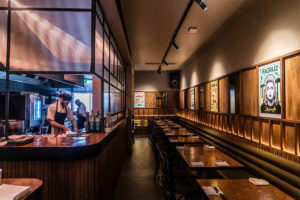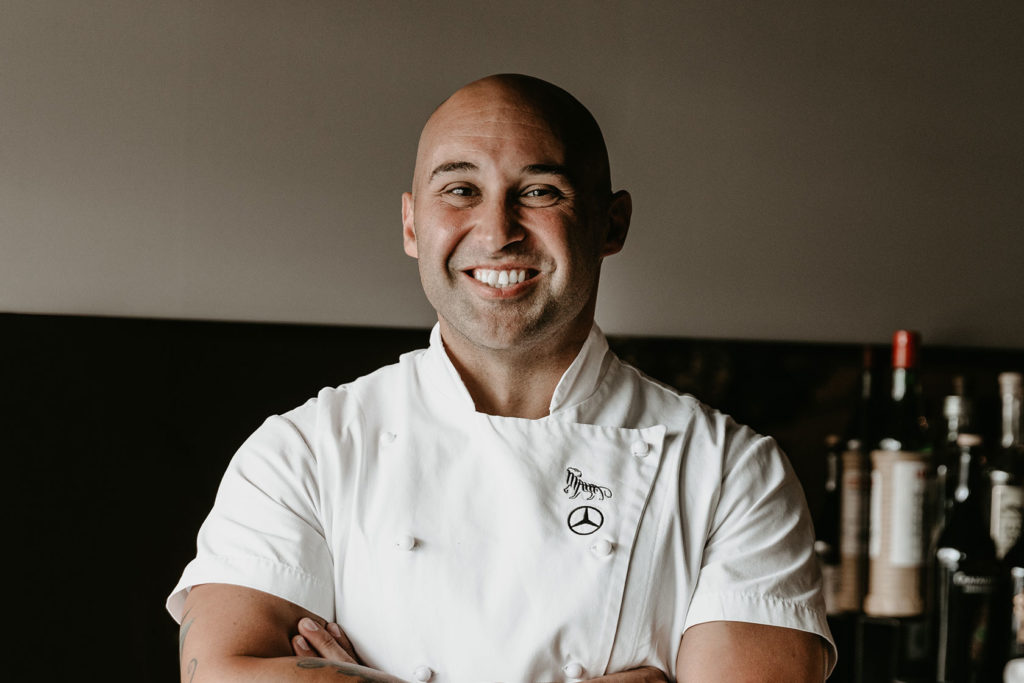Chef Shane Delia talks to BeanScene about creating food memories, the shift in traditional restaurant models, and why the best coffee shops have soul.
Most coffee lovers can attest to one unforgettable coffee experience. For some, it’s the time they tasted their first Geisha or a winning Cup of Excellence coffee, and for others like chef Shane Delia, it’s a memory tied to a location and a point in time.
“After filming a TV segment in Istanbul, I had the last day to explore the city. I started the day with a walk through the city streets. Then I went to a barber, had a shave, went for lunch, walked through the markets, and watched the sun go down. When it does, the light shoots through the city and creates beautiful shadows,” Shane recalls.
“In that exact moment, I came across a little hole-in-the-wall coffee shop called Mandabatmaz, located off the main Istiklal Street. The shop had been there over 150 years and standing out the front was this old guy. He’d been making Turkish coffee his whole life. I ordered a coffee from him and sat outside on a little crate in this alleyway with the sun beaming down. I was drinking a delicious, rich, slightly cardamom-tasting coffee, and it was a really beautiful moment. That was a moment that embraced the soul of the city and was about so much more than what was in the cup.”
Over in Malta, where Shane has ancestral heritage, he says the coffee culture is still accustom to instant coffee, but in some of the older villages on the island, the food and drink traditions are strong.

“The country has an ancestral connection with the Middle East, but over time, it’s become diluted by war, and the current mishmash of cultures,” he says.
“From a food point of view, I feel the country is lacking in identity, but when you strip it back, you’ll find shops serving beautiful traditional spiced coffee such as coffee and aniseed, coffee and chickweed, and coffee and liquorice.”
Back in Australia, Shane continues his own traditions. As a child, he would always find a big jar of freeze-dried coffee in his grandparent’s kitchen. It was their religious morning ritual, and a memory he holds dear.
“My family was of Maltese dissent and growing up, we were poor. Every time I look at a tin of coffee it reminds me of how my grandparents stretched $1 into $10 and were happy with whatever they had. I still keep a jar in the house, and every time I drink it, it reminds me of them. I don’t really enjoy it, but it definitely has sentimental emotions drawn to it,” Shane says. “I think about my grandparents all the time. They’ve past now, and sometimes I like to have a crappy cup of coffee and think about my grandfather.”
From a humble jar of coffee granules to something a bit more elaborate, last year Shane made a considerable upgrade and invested in what he describes as “a beast of a machine” – the La Marzocco Linea Mini – in baby blue.
“That machine has seriously changed my life. It’s changed my morning routine, my respect and understanding of coffee quality. It’s changed my appreciation, how much coffee my wife and I consume, and the way we entertain at home,” Shane says. “Now we can offer guests a fully rounded experience with beautiful coffee to finish. This weekend. I’ve got two sets of friends coming over for coffee because their wives wouldn’t let them buy [an LM Mini].”
Shane says full credit must go to his wife Maha on being the better barista – he still can’t master milk texturing – but he couldn’t be happier with his latest purchase. Shane says the machine has helped ensure that his first coffee of the day – a short macchiato – is “bang on”, followed by a double espresso in the afternoon and sometimes a latte in the evening.
“I’ve always had domestic machines, but when I did some research and discovered this machine had all the technology applied from a commercial machine but in a smaller model, I knew it could handle the volume I wanted,” he says.

“I’ve walked into many coffee shops and always seen La Marzoccos on the bench. When I ask the baristas why they use this brand, they simply say: ‘it’s the best – and it looks cool.’ This brand has a perception of quality. I’m a big car guy, I love old Ferrari badges, and La Marzocco machines have a similar logo and sense of style that draws you in.”
When Shane isn’t perfecting his morning coffee, he enjoys visiting his local Ascot Food Store in Ascot Vale, or Burnside on Smith Street in Collingwood.
“Good coffee shops must have a soul. Coffee is the by-product of that. I look for a good experience, and a coffee that’s familiar, comforting, and not too confronting,” Shane says.
“Melbourne has a very diverse ethnic face that’s quite European, and that culture is embedded in Melbourne’s food, coffee, and community. It’s a community which thrives on quality, whether its quality of architecture, sport, conversation, or food. I think quality is something we gravitate too, including in our coffees shops.”
That same philosophy is what Shane believes his customers at Maha connect with. For the past 12 years, he’s operated the award-winning Melbourne restaurant that celebrates Middle Eastern and Mediterranean cuisine. Like most restaurants impacted by COVID-19 restrictions, Shane was forced to close the restaurant for dine-in service.
He looked at ways to diversify his product offering and launched MahaGo, Shane’s own delivery service, which he says went “unbelievably well”. He also started Providoor, a joint concept involving Melbourne’s top restaurants, producers, bottle shops, and retailers, in which signature dishes are prepared delivered straight to your door.
“We’re giving restaurants a chance to take their premium brand to the people, put their food out there. We’re not selling hot food, we’re selling a food and restaurant experience for people to create at home,” Shane says.

“I feel this model, which is a balance between traditional business which has dishevelled, and something like Providoor, is the future. It gives restaurateurs a real legitimate chance at doing delivery. It’s exciting. It’s not a Melbourne solution, it’s a national solution.”
Shane is excited about reopening his restaurant to diners. On reflection of the past few months, however, he says it’s been a time for hospitality leaders to assess how they can operate better, show who they really are, and prove their commitment to the industry.
“There are some great people who have been able to create new revenue streams, keep staff employed, and pay suppliers, and there are some who haven’t coped as well with the situation,” he says.
“I know it sounds cliché, but it’s been hard. The traditional restaurant model is not going to get any easier. It’s already been announced [from the Fair Work Commission] that there’s going to be a 1.75 per cent increase to minimum award hospitality wages. The economy is going to have a significant downturn, employment is going to rise, and some restaurants will close. Instead, we need to be employing people, we need to create jobs and new experiences, and the only way that’s going to happen is if restaurateurs are enabled to do that. There’s a lot of work to be done and a bigger discussion needed to make hospitality, and the country, sustainable.”
For now, Shane’s message to the industry is to “get back out there and eat”, while he continues to create great food memories and new experience for his customers.
“People are drawn to things that make them happy, and I was lucky to be drawn to food and make it my career, which still makes me happy,” he says.
“I’m always humbled when people dine with us. There are so many great restaurants in Melbourne. People could choose to eat anywhere, so we are lucky when they choose us. We don’t take that responsibility for granted. Some chefs sometimes forgot that. This industry is not about your ego, your legacy, or making a dish architecturally perfect with five ingredients customers have never heard of. It just needs to be delicious.”
This article appears in the August 2020 edition of BeanScene. Subscribe HERE.
Top image credit: Brook James
Other images: Diego Ramirez




